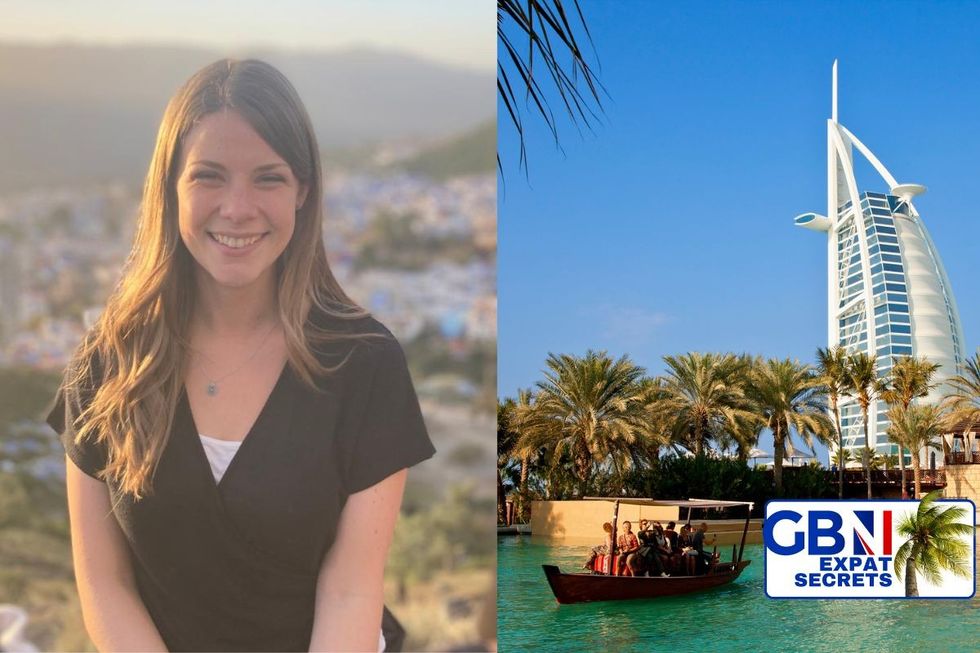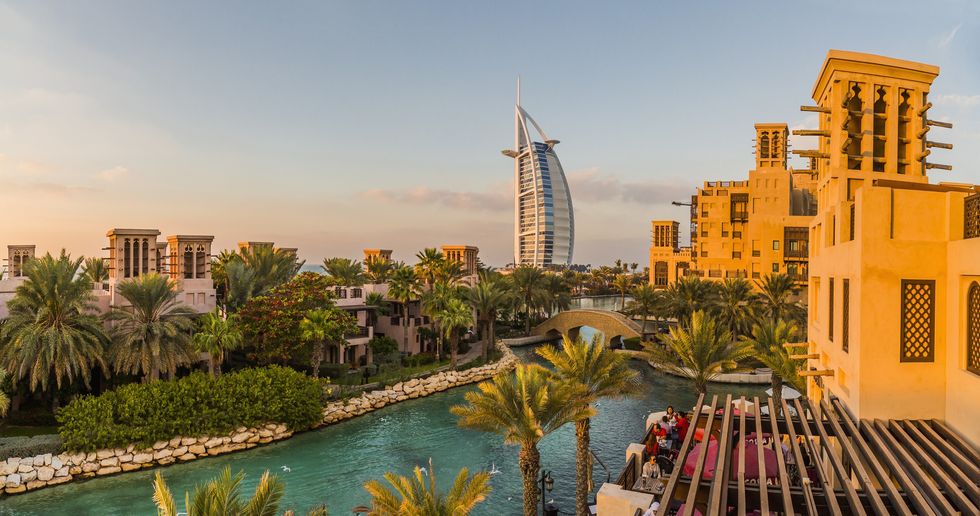GB News is talking to expats across Europe and the world who have exclusively revealed the best places to live, tips and tricks for moving abroad, and the potential pitfalls to avoid. This week, an expat in Dubai revealed what she loves about the UAE city
Don't Miss
Most Read
Trending on GB News
Molly Gaudette, 30, moved to Dubai from the United States three years ago to teach in an international school.
She spoke to GB News about the best things the UAE has to offer, how to hack the heat, and why Facebook is a must have for expats.
For Molly, life in Dubai is varied and exciting. She said: "The ocean is really accessible - I can be at the ocean in 10 minutes. The desert is really accessible. Very authentic food from all different places is really accessible."
Making friends was very easy for the expat. In her first month in the UAE, she was introduced to a lot of people at a friend's birthday party. Her friend - who had moved to Dubai just one month before - had managed to invite 60 new connections to her celebration.

'If someone was really trying to find that sense of belonging, they really could do it here'
Molly Gaudette / GETTY IMAGES
Molly said: "It was actually so funny, she'd met them all through Facebook, and now they're my friends too - I'm going to brunch with them this weekend. They've been some of my best friends the last few years."
Joining a bunch of Facebook groups might be the secret to loving life as an expat.
Via Facebook and elsewhere, Molly has met people from all over the world. She said: "I have found that there are a lot of British expats, South African expats, and Indian and Filipino expats. There just aren't as many locals as there are expats, the expats so clearly outnumber them."
Indeed, around 75 per cent of Dubai's population are expats, with the vast majority being able to speak English.
Molly hasn't met many American expats though, which she believes is a result of the "stereotypes Americans have about the Middle East".
But having relocated to Dubai from Ukraine, she learnt that "just because you're close to some of the conflict, doesn't mean you're in it".
Molly continued: "Dubai really is genuinely one of the safest places on earth - not that I've been everywhere on earth."
Originally from the United States, she feels much safer in Dubai.
Molly has been able to experience some aspects of Middle Eastern culture, although the huge expat population has also meant she has experienced cultures from all around the world.
One of the big positives - and negatives - of Dubai is the weather. Speaking to GB News in late May, she said: "It's getting really hot. Now, I wouldn't go for a walk until after 8pm or 9pm."
Asked what the weather is like currently, Molly guessed "at least 100F - it does get crazy hot." This is equivalent to around 37.7C, which is practically unheard of in the UK.
But how does one cope with the hot weather? Molly explained that life can be very different from summer to winter as expats navigate the heat.
"Now at the weekends plans are usually brunch or pool-orientated," she said. In the winter - when you can expect highs of 22C during January, the coolest month - "we do a lot of camping, hiking, snorkelling, diving and going to the beaches".
Weekend getaways are a fun option too when the weather isn't too hot - "you can drive to Oman".
Humidity is definitely something to be mindful of in Dubai. It was one of the first things that struck Molly when she moved in August just before the school year started.
She said: "You walk out of the airport and it literally feels like you put a pan of water in an oven and just cranked it up to high. It's nasty."
When Molly finds the heat or humidity intolerable, she remembers the weather back home. Back in Michigan and Chicago, where Molly spent time growing up, "it's so cold and so bitter and so terrible".
"So I like to think of the alternative, would I rather be freezing to death right now, or a little bit too warm? The answer is almost always a little too warm," she said.
"When it's really hot like it is now, being in the shade or by a pool makes it pretty manageable."
Molly revealed that most apartment buildings and villas have their own swimming pool - "and if they don't, there's one in the neighbourhood".
When expats in Dubai aren't relaxing by the pool, you might find them out enjoying a meal and a few drinks.
LATEST DEVELOPMENTS

Tourists are permitted to drink in licensed restaurants, hotels and bars attached to licensed hotels
GETTY IMAGES
Tourists are permitted to drink in licensed restaurants, hotels, and bars attached to licensed hotels.
"But since hotels own these big complexes, you're usually at a place that you might not even realise is part of a hotel," she added. "You could be at this standalone restaurant that a Hilton technically owns, but you feel like it's a taco shack on the beach.
Expat-heavy locations tend to be the places that serve alcohol. Molly explained: "I would say that in places that have more locals, you don't see as many venues where you can drink, and that's out of respect for the culture."
Molly has found that respecting the culture also means dressing modestly in some environments. In a government building, Molly was asked to put an Abaya over her leggings, T-shirt and long cardigan when sorting out her visa.
Explaining why she was asked to wear the loose over-garment, Molly said: "It's just a respect thing. I think most of the people in there sorting their visas were expats but everyone's expected to follow the same rules in government buildings."
Asked what kind of people should make the move to Dubai, Molly said: "I would love to encourage people to move here that don't just identify as the party, tourist type. There's a lot of outdoor stuff to do, the beach is accessible and all these things that people wish for is right here and it's public and free."
While she's far off retirement age herself, Molly believes Dubai would be a great place to enjoy your 60s and beyond.
She said: "It's definitely really fun in your 20s and 30s, but I feel like the same demographic of people that would like to retire somewhere tropical and beautiful would also do very well in Dubai.
"There are these neighbourhoods that have really stellar communities. I play sports in some of the parks.
"They have this sleepy, chill, almost Florida retirement home vibe where you have golf carts taking you around the place.
"In these communities, there are community centres complete with golf courses, pools and restaurants all in that area, so if someone was really trying to find that sense of belonging, they really could do it here."
Moving to Dubai
What you need to know
According to expat Catherine, moving to Dubai is a glorious prospect for those who want to enjoy the sun and build their careers. Britons can settle in easily as English is very widely spoken and expat communities are huge. However, before relocating, there are some things expats must know.
Pactific Prime Insurance said: "Expats from the UK moving to Dubai will find that the cost of living is approximately 35 per cent cheaper than in the UK. Combined with the fact that Dubai is a tax haven, this makes the emirate the perfect place for UK expats."
Britons looking to move to Dubai can consult GOV.UK for detailed information on living in the UAE and guidance on how to go about relocating. It is crucial to be aware that UAE laws and customs are very different from the UK, with GOV.UK warning Britons that "breaking the law can result in severe punishment, including the death penalty".
For Britons looking to drive in the UAE, you can apply to exchange your UK driving license for a UAE license in Dubai and Abu Dhabi. They can consult UK Government advice on how to do this.
GOV.UK warned: "It is illegal to drink and drive, no matter how small the amount, and your insurance is likely to be invalidated in the event of an accident."
Guidance on buying property is available on the UK Government's website, including how to choose a property and what to do if things go wrong, but prospective expats have been told that "buying a property that is being resold in the Emirates is similar to the process in the UK".
Britons were advised: "You find a property and place a formal offer, normally through the agent. If the offer is accepted then a deposit should be paid (usually 10 per cent). You will also be expected to pay a transfer fee and estate agent fees."
Renting is another option in Dubai, just ensure that you are using registered agents. In recent years, rental prices have significantly dropped, making the market more competitive.
As for obtaining citizenship in the UAE, Global Citizens Solutions offers guidance. Global Citizens Solutions explained that the pathways for attaining citizenship are descent, naturalization, marriage and exceptional merit.
Why Britons choose to live in Dubai
- Warm climate
- Huge expat community
- Tax-free income
- English-speaking
- Excellent healthcare
- Job opportunities
Possible pitfalls
- Very different drinking culture to the UK
- Stricter laws than the UK
- Suited more for young expats than middle-aged expats and retirees
- Traffic can be intense
- Lack of nature









